Time Keeps on Slippin’, Slippin’, Slippin’
If season four of Lost was about anything other than being incredibly addictive television, it was about time: time travel, paradoxes, rates of change, memory. The season was so packed with plot, however, that it’s difficult for me to see if there’s one thematic through-line that ties the whole season together. So rather than try to force a single reading of the season, I’ll give you several of them, and you can decide which, if any, makes the most sense to you.
Time-related theme: Regret
Episodes: “The Beginning of the End,” “There’s No Place Like Home”
Time tropes: Flashforwards, ghosts
Analysis: In “The Beginning of the End,” the “time theme,” if you will, is regret. (I hasten to mention, for those of you who do not know, that regret isn’t possible without the passage of time.) Hurley regrets leaving the Island, just as bearded Jack did at the end of the last season. Hurley is also visited by ghosts—specifically, the ghost of Charlie, and, later on, the ghost of Mr. Eko. Ghosts, while not directly related to time travel, are usually metaphors for regret. Ghosts also tend to live outside of time. From a psychological standpoint, Hurley sees the ghost of Charlie because he regrets letting him die. From a plot standpoint, Charlie is a real ghost who arrives to tell Hurley he’s made a huge mistake: Hurley and the others must go back to the Island, and Aaron must not be raised by Kate and Jack on the mainland.
Likewise, in “There’s No Place Like Home,” the Oceanic Six are haunted literally by ghosts (Charlie, Libby, and Claire—does this mean she’s dead?) and figurative ones. Sun regrets leaving Jin to die on the freighter, and Kate is clearly thinking about Sawyer all the fricking time. Sun doesn’t actually see the literal ghost of Jin, and Kate doesn’t literally see Sawyer’s ghost, but their memories clearly haunt them throughout the season finale. The memory of the Island haunts them, too. It’s clear that they all regret leaving the rest behind.
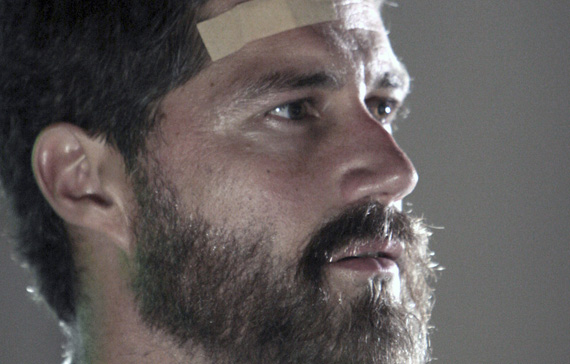
Jack's beard also symbolizes regret.
Time-related themes: Regret and revenge
Episodes: “The Economist,” “The Shape of Things to Come”
Time tropes: Flashforwards, memory
Analysis: Here, the “time theme” is not only regret, but revenge. In “The Economist,” Sayid works for Ben to get at Widmore to get revenge for Nadia’s death. At the same time, though, Sayid falls for Elsa, probably trying to recapture his lost love for Nadia. However badass Sayid tries to be, he is, at heart, a hopeless romantic. He fell hard for Nadia, and, now, he’s falling hard for Elsa, probably because she reminds of him of his lost love. Sayid’s assassination of Elsa is both revenge for Nadia’s death and a symbol of his regret over it. He cries at the end of this episode not just for Elsa but for Nadia. Just as he killed Elsa, he allowed Nadia to die. Regret and revenge work hand in hand here.
The same mingling of regret and revenge occurs in “The Shape of Things to Come.” In retrospect, the idea of having Ben and Sayid work together is rather brilliant. Both of them are, on the outside, cold-hearted killers, but both are also grieving on the inside. As in “The Economist,” “The Shape of Things to Come” is stained with the memory of a tragic and preventable death—in this case, Alex’s. In revenge, Ben will kill Charles Widmore’s daughter. Charles, meanwhile, thinks he’s acting in revenge for Ben’s taking over the Island so many years ago. In both Sayid and Ben, the pain of regret is channeled into the violence of revenge.
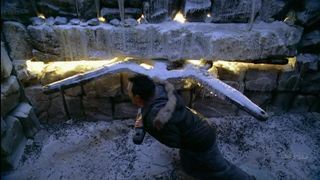
To everything, turn, turn, turn...
Time-related theme: Love is a constant
Episode: “The Constant”
Time tropes: Mental time travel, time machines
Analysis: In this episode, the flashbacks we’ve seen throughout the series have been literalized. Desmond is literally flashing back and forward through time. What is the theme here? Why, love, naturally. Desmond is shuttled back and forth through time and through his own memory but manages not to die because he is tethered by a constant: his love for Penelope. In this reading, time travel is a slick sci-fi device used to illustrate an age old axiom: true love waits. (Alternatively: true love is destined.) Finally, we have some optimism. In the past, Desmond regretted what he did to Penelope. Now, through the dual power of time travel and love, he’s able to right that wrong. Unlike Sayid, Ben, and the Oceanic Six, Desmond no longer needs to regret, because time travel saved the day.
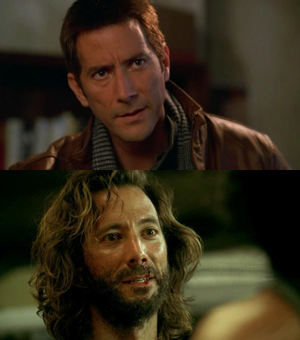
Another time-related trope: alternate hairstyles.
Time-related theme: Redemption
Episode: “Ji Yeon”
Time tropes: Trick flashforwards/flashbacks
Analysis: In this case, time travel is used as a simple trick: the supposed flashforward is actually a flashback. At first, I thought the writers just wanted to screw with me, as in, “Ha ha, you thought Jin was rushing to Sun in the future, but really he was rushing to some other woman in the past. Fooled you!” I suspected they didn’t want to use the multiple flashbacks and flashforwards toward any thematic end.
On the other hand, the trick did show how far the Sun-Jin relationship has come. In the past, Jin only cared about work, not his wife. Now they care about each other so much that Sun calls for him when in labor and buys up her father’s company out of revenge for Jin’s death. On the Island, the once heartless Jin forgives his wife for having an affair, something I believe he never would have done had he not crash landed on the Island in the first place. Although this episode ends on a down note at Jin’s grave, overall I see this story as one of redemption. Whether the writers meant to or not, the multiple timelines in this episode managed to get across a good theme: there are second chances.
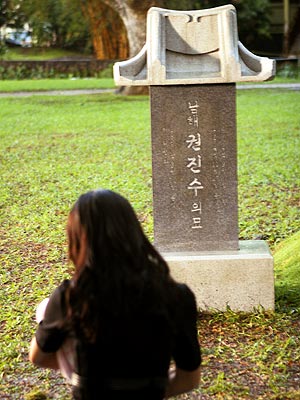
If Jin's really dead I'll eat my hat.
Time-related theme: The inexorable nature of time and fate
Episode: “Cabin Fever”
Use of time: Multiple flashbacks, stable time loops, repetition
Analysis: In this episode, we get hints of the cyclical nature of time. Repetition is a theme here: Richard visits young Locke just as he once visited young Ben. Abaddon visits Locke in the hospital just as he visited Hurley in the mental institution. Young Locke screams “don’t tell me what I can’t do” the same way he did back in “Walkabout.” In the cabin, Claire acts creepily content, like she did back in “Maternity Leave.” And, of course, Christian Shephard pops back for the bazillionth time.
The scene where the ageless Richard visits Locke back in the foster home is particularly interesting. Richard asks boy Locke which items are his, which suggests that Richard knows Locke in the future—and very well, in fact. That brings up the question: how does Richard know future Locke so well? Is Locke in the future actually Jacob? But if Locke is dead in evil-beard-future as Jeremy Bentham, how can he be Jacob, too? Is Jacob a ghost? Or, better yet, is he Locke’s ghost from the future who can also travel to the past? (Because ghosts can totally time travel? Hey, it worked in Dickens.)
Really, I have no idea. Thinking about all this stuff is giving me nosebleeds. In any event, it does seem like Lost is trying to set up some time loops here. Things seem to be happening in the present or future not due to random coincidence or due to cause and effect, but because they already happened. Under this reading, everything in this universe has already happened–everything–and thus everything is predetermined. It’s Desmond’s fatalism all over again.
So what’s the true theme of season four of Lost? Is Lost a pessimistic show about the never-ending, predetermined cycle of regret and revenge? Or is it an optimistic show about the redemptive power of love? If one’s destiny is already set, is that a good thing—as in, Desmond and Penny are destined to find each other again—or a bad thing? Is destiny, as Ben Linus says, a fickle bitch? Sound off in the comments.
Next time on Overthinking Lost: I really have no idea. What will season five bring? If it’s as crazy as season four was, more wacky time-related hijinks are on their way.
Remember: No spoiling season five for me! If you want to talk about season five, do so in the thread beneath Ryan Sheely’s spoileriffic post.
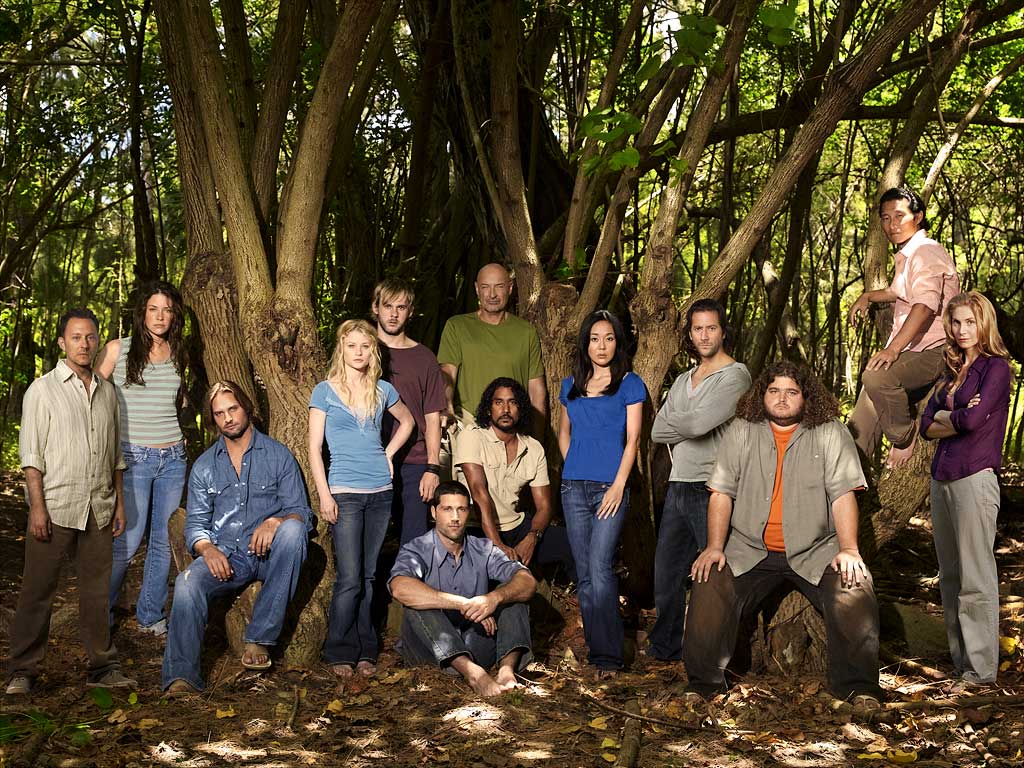
She didn’t even get a flashback <—- ROTFL
Loving your analyses, Mlawski, and I love how you’ve got utterly sucked in and watched season 4 in one go! Me too ;)
I wanted to ask you if you have watched the DVD extras on the seasons as you’ve gone through. I remember you said you weren’t going to and someone advised you against that strategy. In particular, the mobisodes (Missing Pieces) on the S4 DVD are well worth a few minutes of overthinking.
I would also agree, you should watch all the DVD extras – well, not the ‘Making of’ type, they’re pretty boring, but the other stuff is definitely worth thinking about, and not spoiler-y for S5 in my opinion. Maybe a few clues, but not spoilers…:)
And thanks for these articles, I have enjoyed them muchly!
I think the show will ultimately have the endless tragic cycle of fate be broken by the transcendent power of True Love — which, as we saw in “The Constant,” defies the rules of time and logic. At any rate we won’t really know until the end of season six.
By the way, as I mentioned last time, Geoff Klock pointed out the cool absurdity of Ben’s house. So in a tropical jungle there’s a suburban bungalow. Inside that house there’s a secret high-tech James-Bond-style room. And inside that secret room there’s a second, magical, Egyptian secret room! All this serves as a pretty good metaphor for the layers-of-an-onion way Lost handles its mysteries.
No love for “The Constant”? Really?! Come on — that’s probably my favorite episode of all, not to mention a fan favorite! It has heart, humor, but most importantly, some really cool sci-fi beats at each act break (example: “I need you to go to Oxford, Desmond… to find me!” CUT TO BLACK).
And I hesitate to add that I always get choked up at the end of the episode… love Desmond and Penny.
But let’s get back to Season 4. I was hoping your recap would be broken up into two parts, since there’s a lot of ground to cover…
I really, REALLY wish the WGA could have waited until, say, 2011 to go on strike. I think having a strike-shortened S4 really threw a wrench into things, which contributed to the rushed and overloaded episodes, as you noted. Would have been good to have things breathe a bit more…
Thought #1: is Claire dead? I think so, but no one in the fan community knows for sure; the Oceanic Six certainly think she’s still alive. But that was a pretty terrible explosion, wasn’t it… I rewatched the episode over the weekend, and key to the scene (which I think most everyone missed originally) is the line from Miles in Ben’s house — they ask Claire if she’s OK, and she says something like “I’m a little dizzy, but I’ll live.” Miles answers “I wouldn’t be too sure about that.” Now, originally I thought (as I think most people do) Miles is just referring to their situation — they’re surrounded by the mercs and they seem to be doomed. But remember, his quips often have the ring of truth to them — and he’s the only one who can speak to “ghosts,” “spirits,” whatever you want to call them. So I’m guessing she’s actually dead, and the island made her appear to live for whatever reasons it may have had at the time. (Also the reason why you see her with dead Christian in Jacob’s shack)
Thought #2: was anyone at all disappointed by the abrupt killing of Rousseau? I’ve always regretted that. (Now, Karl… I have no qualms about him)
Thought #3: why was Desmond’s vision wrong? Why did Claire not get on the helicopter with Aaron? (This is actually the one thing that’s bugged me about that whole plot point) I’m wondering if this will come up again in S5/6…
Thought #4: when it comes to “Meet Kevin Johnson,” I had forgotten ENTIRELY about Libby popping up from time to time. Makes me wonder why the creators insist Cynthia Wattros didn’t want to come back post-S2 to do any guest appearances…
Thought #5: I’d love to hear your thoughts on the “frozen donkey wheel” that Ben turns at the end of S4 (which transports him to… the beginning of “Shape of Things to Come,” another favorite ep of mine). He ends up in Tunisia… Charlotte’s ancient polar bear skeleton was found in Tunisia… the island is connected somehow to Egypt (with all the hieroglyphics in the underground caverns), which is near Tunisia… so what’s the deal?
Thought #6: I never thought Keamy was all that menacing in his first few episodes; by the time we get to the end of the season, he comes off as an unstoppable, psychotic killing machine. I absolutely LOVED that.
Thought #7: just what the heck are the “rules” Ben mentions to Widmore? If Widmore broke them to kill Alex (sniff)… can’t Ben do the same and just kill Widmore? Hmm…
Thought #8: so Hurley can not just see Jacon’s cabin, but is able to locate it as well… is he “special” in the same way that Walt and Locke are? Is he key somehow to what’s been happening on the island?
Anyway, my apologies for an epic post — lots of things to discuss from this season. Now HURRY UP and get to S5… which may be my personal favorite of them all! And then we can talk a little more directly…
@Kevin: Thought #3: why was Desmond’s vision wrong? Why did Claire not get on the helicopter with Aaron?
It could simply be that Desmond lied so Charlie would be willing to die so he could get back to Penny. Or he saw Aaron get on the helicopter and just assumed Claire would be there, too.
@mlawski: Did you read the Time Traveler’s Wife before seeing the movie? I can’t imagine it was as layered as the book.
@Tom: I think at this point, Des wouldn’t do anything to intentionally let Charlie be harmed — remember, they canoe out to the Looking Glass, and Des tells him to stay put… HE is going to turn off the jammer. (Charlie, of course, has other ideas.) So he wouldn’t lie to him just to get to Penny. I also don’t think his vision was so vague that he’d assume Claire was with Aaron… but now that you mention it, the few visions we DO see of his are extremely fragmented. It’s possible.
I’m wondering if somehow, his vision actually WILL end up coming 100% true — though that will take someone playing around with time itself…
“The Constant” is also my favorite episode, Kevin. I’d add that there is also an element of redemption here, too- and that there are definitely strong currents of love in “Ji Yeon.” In “The Constant,” the whole reason Des couldn’t find Penny when in “the past” was because he dumped her, but he is redeemed when he makes the life-saving phone call. He earned that redemption because of that strong love he never let go of- it was so “constant*” that he got her back, so to speak. In “Ji Yeon,” the bond between Sun and Jin is redeemed, even though both demonstrated duplicity and disregard for it before the island. Sure, okay, Jin is “dead,” but what happens on the island makes Sun miss him so much that she still cries out for him and tells the hospital workers helping her give birth to call him; and the island’s events cause Jin’s love for Sun (and their unborn child) to give him impetus to allow himself to die, or at least make sure they’re safe before thinking of his own safety.
I wouldn’t be surprised if Claire actually died, but there is a kink with this: while the people we know for certain died appear as visions during waking hours, Claire appears in a *dream*. Oh, the ambiguity.
I’d posit season 4 is attempting to say that how we approach our destiny determines how we experience it. Does that make sense? My example is, again, “The Constant.” Des and Penny are destined to be together, but Des tries to break up with her; yet he can’t get away from her, even when they’re in different times. When he finally, fully accepts this, he reconnects with her- but up until that point, it was pretty dang sh*tty for the both of them.
Oh, and yeah, I was pretty “WHAT?!”-ed by Rousseau’s death. I didn’t really care about the boyfriend, but her? Yikes.
*Like so many multiple-meaning items in the series, I think the word “constant” as the episode title refers to Penny AND Des as being what keeps time-travelers alive (because if Faraday is writing that, it’s not unreasonable to assume he’s been time traveling, too, or that he will), the love the two have for one another, their never- waving hope that they’ll be together again, and their continuing searches and efforts to reunite.
For the record, I DID like The Constant, a whole lot. I only said that it wasn’t my favorite Desmond episode — I think I prefer Flashes Before Your Eyes, personally. I know what I’m going to say next will be unpopular, but here goes: The Constant was incredible from a technical perspective–the flashes back and forth in time could have been very confusing, but they weren’t–and the end was wonderful. My issue was with the shady physics of the whole thing. I guess I can accept the whole “time travel makes your nose bleed” thing, even though it’s kind of silly; Dan said the nosebleeds were caused by a brain hemorrhage, but I’m pretty sure that would cause much worse symptoms than nosebleeds–like, say, a stroke. I also have other complaints about the nosebleeds, but those are season five-related, so I’ll save those for next week.
The nosebleeds are one thing, but this idea that you need a human constant to fix time sickness doesn’t make sense to me at all. Why does it have to be a person and not a place or an object, for instance? Surely 1996-Desmond recognized SOMETHING when he traveled to 2004–it’s not like he traveled to a time period that was so completely different his brain would explode trying to understand everything. I know it wouldn’t have been as wonderful an ending, but couldn’t someone on the freighter have played a Spice Girls song so Desmond could use that as his constant?
And, really, 1996-Desmond doesn’t know ANYONE else’s phone number? He couldn’t have called his parents? Or a friend from high school? Or are we to assume that everyone he knew changed their phone number over the last eight years?
Sorry, I’m being pedantic, I know. But when sci-fi stories don’t work on a sci-fi level, it bothers me, and I can’t enjoy the emotional bits as much.
@Tom P: No, I never got around to reading The Time Traveler’s Wife. I’d assume the book was better, if only because I really did not like the movie.
@Kevin: Re: your question about why the Island seems to be linked to Egypt, I have your answer: aliens. The aliens built the pyramids, didn’t they? QED. (No, I’m really not giving up on my “aliens did it” theory of Lost. Not now! Not yet!)
@mlawski: re “The Constant” — IIRC, Farraday says a constant DOESN’T have to be a person, it can be ANYTHING. But the key is: it has to be something that has a *special* meaning to you in both time periods.
It’s not like Des could have landed on the freighter, said “Hey! This is a boat! I knew about boats in 1996!”, and been fine. It’s got to be something really, really important… and for Des, the most important thing in life is Penny. (And given that we’ve never seen him talk to his parents, much less mention them, I don’t think they’re important to him at all… if they’re even still alive. Same with his friends — he’s had no contact with them for years by 2004, unlike Penny.) And it’s not so much a question of “understanding” what’s going on, or what time period you’re in — it’s being able to lock your brain down to some sort of personal consistency about your life. To “jump start” things, if you will, and get you back on track.
And re: the nosebleeds — honestly, I think it’s mostly a consistent, “filmic” way of showing someone gradually falling to pieces. Sure, they could have passed out instead… but nosebleeds, frankly, are cool. Mainly because it allows the other characters to go “Hey… your nose…”, and the victim to wipe quizzically at their face, only to see the blood and realize they don’t have much time left. I don’t think the writers cared that much about the biology or “science” of it… just that it worked effectively.
(Most importantly… it sounds like you’re already into Season 5. Yes!)
As for Egypt: did you know they Lost staff actually has an Egyptologist on the crew? Don’t know how long that’s been the case… but we’ll see if your alien prediction comes true. You never know!
@ mlawski: I assumed Desmond needing a constant meant a strong emotional bond, not some random object of familiarity. That likely implies that Desmond becomes more important to Faraday though, I suppose.
I’m curious to get your take on the father figure/issues as they relate to redemption, if you get a chance.
Am really enjoying your analysis each week. Thanks! :)
“Oh, lordy… Am I a Ben Linus fan? I think I might be. I didn’t know that about myself until right now. ”
Haha, this was basically my exact reaction to that episode as well. :D
“Kate thinks about Sawyer all the fricking time”
As a Sawyer and Kate fan, I enjoyed this observation a lot.
@mlawski: now that you’re all the way through S4… I’m curious if you have any interest in Michael Giacchino’s score for the show. I find it to be some of the most richly-themed music written for television, with an abundance of motifs that are repeated throughout each season. And most of the characters have their own unique themes — I’m particularly fond of Sun/Jin’s and Rose/Bernard’s. I know it has little to do with the more obvious elements of the series (plotting, acting, symbolism, character naming, etc.)… but it’s probably the most widely-praised piece of the show overall.
If you’re interested in soundtracks at all, Varese Sarabande has released music from the first four seasons on CD, available online through an Amazonian retailer (among others)… and you can also download through the iTunes store if you go that way. (I know I can recommend individual tracks to download if you’re at all interested for a taste… as I’m sure some of the other readers can as well.)
Any thoughts? Would love to hear!
@nighten: That’s a great topic, and I’ll definitely keep it in mind, especially if Lost ever reveals to me what the deal with Christian Shephard is. Argh, why is he everywhere?!
@Kevin: Good point. I should have mentioned the music a long time ago, because it is amazing. Definitely one of the best TV soundtracks I’ve ever heard. I’m not sure there’s much to overthink there, and if there is, I’m not sure I’d know where to start. If you’ve ever read this site’s music-related posts you’ll soon realize I know absolutely nothing about music theory. I’m not really sure I’d like listening to it on its own, either. It works really well as a TV soundtrack–in other words, in context. But I’ll keep this topic in mind, too. Maybe I’ll come up with something interesting to say…
@mlawski: oh, that’s a good point — as far as “overthinking” the music, I don’t know that you really can. There are no hidden clues or subtext to the music… though I should add that if there IS, I’m probably not educated enough in music theory to decode them. So you’re right, maybe this isn’t the best place to discuss it.
I will say, though, that what makes the music so good is that I think it stands alone as well-crafted, beautiful music — you can listen to it independent of the show and enjoy it. (I gave some of it to my parents, who’ve only seen a few episodes here and there over the years, and they loved it.) It’s one of the few shows — maybe even the only show currently on the air — to be scored each week by an orchestra, not a single person sitting at their synthesizer. And the instrumentation is quite clever — for percussion, Giacchino used the sides of… airplanes, though that pretty much went away after S1. (It also helps if you’re into gentler music — he scores action scenes well enough, but where he shines are the slow, quieter moments.)
P.S. If you’re curious for a listen… I recommend “Parting Words” from the S1 soundtrack, then probably “Life and Death.” But there are a whole slew of great tracks from across the series.
P.P.S. On second thought, there actually *is* something to “overthink” regarding Giacchino’s score — how he comes up with some of the awful puns for his song titles, or alternately what obscure media reference he’s making in them…
“Thinking about all this stuff is giving me nosebleeds. In any event, it does seem like Lost is trying to set up some time loops here. ” nosebleed huh? hehehehe just wait until season 5 if you wanna talk about nosebleeds.
I LOVED season 4, after struggling through season 3 really believing the writers had no idea what they were doing or where things were going season 4 showed just how very wrong I was. It is awesome the way some of the big mysteries play out and some of the relationship dramas unfold. I started to love characters I didn’t like before, namely Juliette and started to hate some characters I used to like, such as Sayid who just keeps torturing and killing people season after season regardles of his oath(s) to not do that.
And The Constant is just about the best sappy ending in the history of TV. Desmond is such a strong character, and played by such a talented actor, that what could have come across as a cheesey romance plot was brilliant
Exciting news for LOST fans!
This Saturday, September 12, in Anaheim, CA, LOST cast members are going to be making a public appearance at Disney’s D23 Convention; additionally some really fantastic pieces of LOST history are going to be on display- including Kate’s toy plane, Hurley’s winning lottery ticket, Locke’s hunting knife, Sawyer’s letter and many other surprises! These items will be on view Thursday September 10 through Sunday, September 13, the entire weekend of D23, and will be up for auction after the series finale in May of 2010.
Look for the guys in the Dharma suits!
for the full story, go to profilesinhistory.com